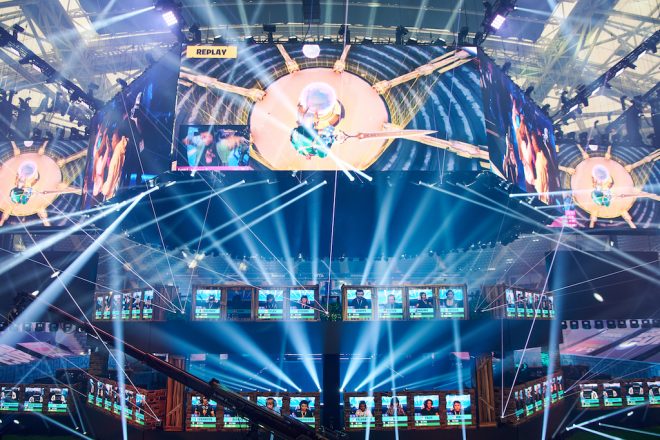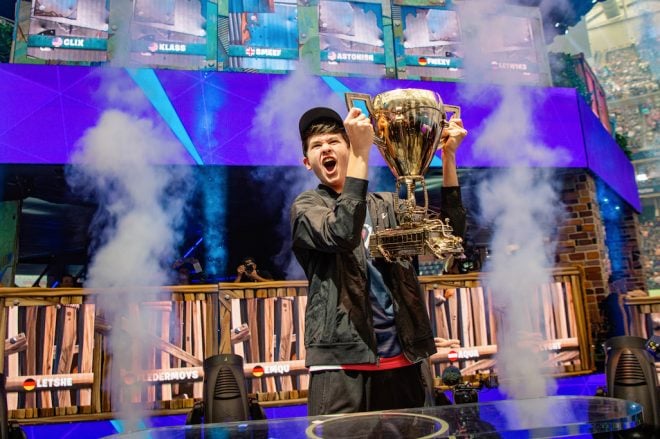This Teen Just Won $4.3 Million At The ‘Fortnite’ World Cup. That’s Not Even The Best Bit.

Is Fortnite an esport? Is it easy to watch? Is there too much to follow? The Fortnite World Cup proves one thing: Yes; Not really; It’s a lot; and, most importantly, it just doesn’t care what anyone who isn’t a fan thinks.
The Fortnite World Cup took place this weekend in New York City, in the hallowed US Open centre court stadium where the greats of tennis clash each year. The court was turned into a two-story digital arena to seat the 100 competitors in an octagon-ish arrangement, all facing out toward the over 10,000 strong crowd surrounding them. Add screen after screen after screen of player views, player cameras, live match data, and then the rest of the in-game cameras covering the action.
I’ve travelled to some of the biggest esports events in the world. This stage took the cake.

Outside, a fan festival with cosplay photo opportunities, a custom Fortnite mini-golf course, a Nerf shooting gallery, and lots more. Play enough of those games, and you could level up a real-life Battle Pass and score swag you’ll never find anywhere else.
Everything about this event was perfectly designed for people who love the game. To come together, to spend time in the glow of the game they love, and to see the world’s best fight it out for the biggest prize pool in esports history. Over three days, US$33,000,000 (~$47.8M AUD) was awarded across a series of events, with the Solo and Duo champions each pocketing US$3,000,000. Second place? Still a cool $1.8M.
A lot of esports spend time trying to accommodate new viewers in the commentary around their biggest events to grow the game’s audience. Fortnite‘s presentation and its commentary just doesn’t worry about it. It’s serving its massive audience of over 250M players and giving them the event they dream of being a part of.
It’s not unapproachable; it just doesn’t slow down to explain. It backs the game itself, or other fans who are showing you the game, to teach you as you watch. Imagine if rugby commentators explained tackle and offside rules fifteen times during a match to make sure all viewers understood what was happening. That’s the bit that Fortnite has decided it’s not going to do anymore. And it’s kinda great.
The Room Where It Happened
To call that event stage two-stories tall is underselling it. The stage is really about five-stories once you count the screens that hang above everything and the light show attached to it all. It’s an absolute monster.
When I posted one photo of the stage on social media, the first reply was that there was too much going on.
That stage: #fortniteworldcup pic.twitter.com/ZVkIIEnDek
— Seamus Byrne (@seamus) July 26, 2019
Sure. Absolutely. It looks completely ridiculous. But Fortnite is ridiculous as an esport. There are way too many players to track and cover and foreground as a match progresses. But that’s the critical art that has been refined over the past year. Observers, the virtual camera operators tracking the action inside the game, trying to point their invisible cameras at the right action at the right moment, is quite simply the most important jobs in all of esports today. And the Fortnite Observers crushed it.
Back on that set with too many screens, every screen in front of a player seat offered a wealth of added info. Name, country, health, animations when they picked up and used items. When they died, they disappeared, so you can see who is still in the game by glancing across the stage.
It’s a lot of info, but it’s trying to be as much as any fan could ask for. Not focus on the fear of being too much for newer fans to cope with.
Spectacular Spectacular
Having said that Fortnite doesn’t care about trying to be for anyone that isn’t a fan, the Pro-Am event on Friday was a reminder of just how mainstream the game is anyway. 50 well-known players teamed up with 50 celebrities to compete for millions for their chosen charities.
Four Aussie Fortnite stars, Muselk, Loserfruit, Lachlan, and MrFreshAsian all took the stage, teamed up with Aussie celebrities – DJ Wax Motif, Producer/Singer Alison Wonderland, Actor Liam McIntyre and actor Desmond Chiam respectively.
Sports stars, actors, musicians, all psyched to be on the stage for the big event. There’s one hell of a virtuous cycle here too. When Drake played with Ninja, it was the biggest Twitch stream of all time. When Marshmello played a concert inside Fortnite in February, his Insta account grew by a million followers within days. Fortnite has won cred without looking like it’s tried too hard to get it, and celebs get a boost because the game has an audience population on par with Brazil or Indonesia.
So it was no surprise when a surprise announcement was made to have Marshmello – Ninja’s Pro-Am partner and mega virtual concert giver – played a short set before the main event on Sunday. For six minutes he went off, playing his hits, and the massive screens joined in the show to make the small set feel rather huge.
Amazingly, the age span of players on stage was 14-24. The average age was 16. So many teenagers seeing dreams come to life, and many more at home will feel that rush of energy to keep working to be here next year.
Results Speak For Themselves
Sadly, the ANZ contingent didn’t take high placings, but even the least successful qualifiers took home US$50,000 each – plus winnings from the World Cup qualifying tournament, they’re sitting in a pretty nice place even if they’d never won anything else.
The Duos event was won by European pair Aqua and Nyhrox, winning in a close finish just four points ahead of second place with only three more points separating second through fifth. That’s the difference between $2.25M for second and $900,000 for fifth.

The Solo event was a tense series until game five (of six). 16-year-old Kyle ‘Bugha’ Gierdorf had at that point built a strong lead after a victory in the very first match and lots of eliminations scoring him big points. In the final round, he played one more great match to finish in the final five and extend his lead to make for a dominant final scoreline, winning the title and $4.3M by a massive 26 points.
Bugha’s family was in the room, wearing his team shirt and cheering and crying as he won. Everything about this moment says, yet again, that anyone who says esport isn’t real sport has never seen it in action.
What’s Next?
Things are about to change. During the Solo Final, Epic teased the launch of a Fortnite Champions Series as the next phase of Fortnite esports. To date, it’s all been a mix of online open qualifier and invitational events. A ‘champions series’ could add a tier where the game’s most famous players face-off regularly, giving fans more chances to watch their stars compete.
The series will kick off as part of Season 10, which launches later this week – and all signs point to the map changing in a big way yet again, with a ‘Think Back’ tease suggesting maybe there’s some time travel back in time after the last season took the game into the future.
But today, the first Fortnite World Cup marked the end of a blowout first two years for the game that grew more by word of mouth than OTT marketing campaigns. Now it has delivered a solid message that the game has nothing to prove to anyone but its fans, and with the cash to throw the biggest esports events on the planet. The game’s destiny as the dominant force in popular gaming is well and truly in its own hands.
Seamus Byrne is a veteran nerd industry journalist covering tech, esports, and all things shiny and new. He’s @seamus on Twitter and runs the Byteside podcast network.


